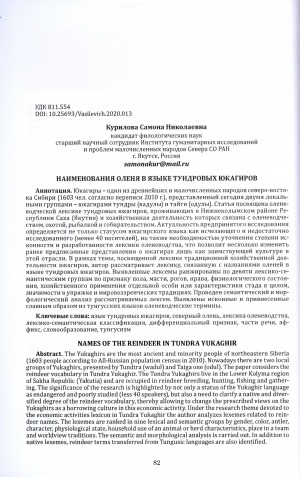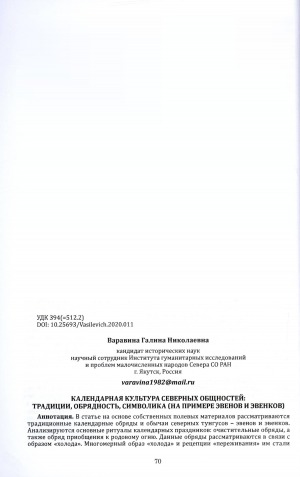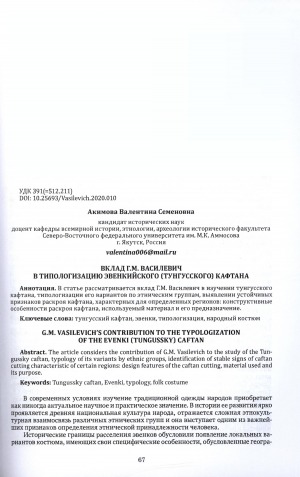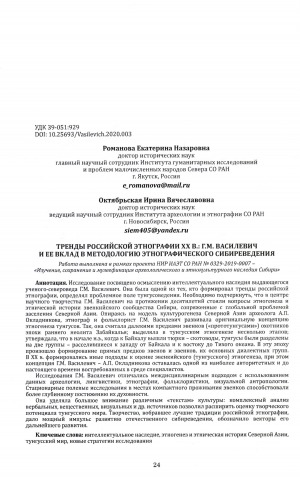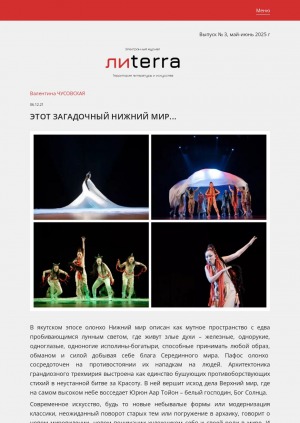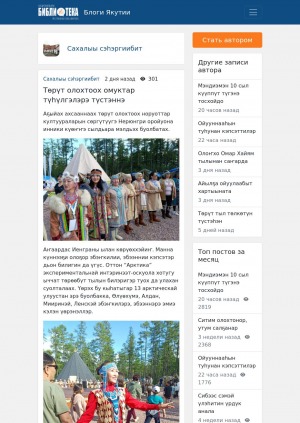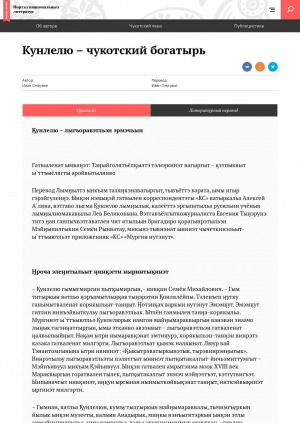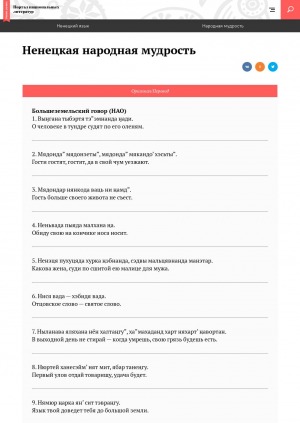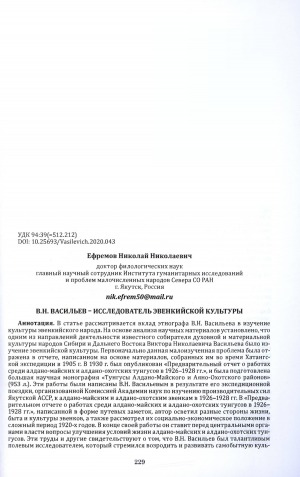- Книга (1379)
- Журнал (8)
- Автореферат диссертации (65)
- Изоиздание (36)
- Аудиоиздание (27)
- Видеоиздание (84)
- Неопубликованный документ (3)
- Нотное издание (3)
- Фотография (12)
- Статья (435)
- Библиографический указатель (15)
- Словарь (2)
- Календарь (1)
- Брошюра (27)
- Буклет (13)
- Электронное издание (2)
- 3D-модель (24)
- Грампластинка (5)
- Веб-архив (499)
Количество страниц: 8 с.
- Общественные науки. Образование > Этнография. Обычаи. Жизнь народа. Нравы,
- Языкознание. Филология. Художественная литература > Языкознание и языки. Лингвистика > Юкагирский язык,
- НАУКА ЯКУТИИ > ЯЗЫКОЗНАНИЕ. ФИЛОЛОГИЯ. ЛИТЕРАТУРОВЕДЕНИЕ. ХУДОЖЕСТВЕННАЯ ЛИТЕРАТУРА > Языкознание и языки. Лингвистика,
- КНИГАКАН > Все народы > Юкагиры (палеоазиатская группа языков) > Языкознание,
- КНИГАКАН > Все народы > Юкагиры (палеоазиатская группа языков) > Этнография. Фольклор.
- 1. Народы и культуры Северной Азии в контексте научного наследия Г. М. Василевич: сборник научных статей, 2020
- 2. Максимова Саргылана Васильевна, Бойтунова Светлана Иннокентьевна. Культурный код этнолога Уллы Йохансен в дарственной коллекции Национальной библиотеке Республики Саха (Якутия) = Ethnologist Ulla Johansen's cultural code in the donation collection of the National library of the Republic of Sakha (Yakutia)
- 3. Варламова Юлия Александровна, Варламов Александр Николаевич. Сибирь" в эвенкийском фольклоре: к вопросу об этимологии топонима = "Siberia" in the evenki folklore: to the question of etymology of toponym
- 4. Варламов Александр Николаевич. Образ лося в мировоззрении и фольклоре тунгусо-маньчжурских народов: к вопросу о ранней истории тунгусов = The image of a moose in the worldview and folklore of tungusmanchu peoples: on the question of earlier history of tungus
- 5. Унру Софья Александровна. Персонажи современного необрядового фольклора эвенков = Characters of modern non-ritual folklore of the evenks
- 6. Ушницкая Наталья Юрьевна. Глаголы перемещения в эвенкийской языковой картине мира = Overcoming space in the evenk language picture of the world
- 7. Кузьмина Раиса Петровна. Концептуализация жалости в эвенской языковой картине мира = Conceptualization of pity in even’s language picture of the world
- 8. Николаев Егор Револьевич. О тунгусо-маньчжурских заимствованиях в лексико-тематической группе "Пища" в якутском языке (по лексикографическим материалам) = On the tungus-manchu borrowings of the lexical-thematic group "Food" in the yakut language (based on lexicographic materials)
- 9. Дьячковский Федор Николаевич. Семантическое освоение якутских слов в говорах эвенков Якутии (на материале "Эвенкийско-русского словаря" А. Н. Мыреевой) = Semantic adaptation of yakut words in evenki dialects in Yakutia (illustrated by A.N. Myreeva's Evenki-Russian Dictionary)
- 10. Курилов Гаврил Николаевич. Отражение в языке юкагиров одной из древних культурных традиций = Language in the disclosure of one of the cultural traditions of the ancient yukagirs
- 11. Петров Пантелеймон Пантелеймонович. Загадочная "Земля якутского дворянина": история одной карты Северо-Востока Азии и Аляски (XVIII в.) = Mysterious “Land of the yakut nobleman": the history of a map of Northeast Asia and Alaska (XVIII centure)
- 12. Бойтунова Светлана Иннокентьевна. Истоки книжности народов Севера (1812 - XX в.): историческая реконструкция = The origins of the bookishness of the North peoples (1812-1917): historical reconstruction
- 13. Романова Екатерина Назаровна, Октябрьская Ирина Вячеславовна. Тренды российской этнографии XX в.: Г. М. Василевич и ее вклад в методологию этнографического сибиреведения = Trends in russian ethnography of the XXth century: G. M. Vasilevich and her contribution to the methodology of ethnographic studies of Siberia
- 14. Санникова Яна Михайловна. Традиционные хозяйственные занятия коренного населения Анабарского региона Якутии на рубеже XX - XXI вв. в контексте исследования культурного ландшафта = Traditional economic activity of the indigenous population of the Anabar region of Yakutia at the turn of the XX-XXI centuries in the context of cultural and landscape research
- 15. Филиппова Виктория Викторовна. Эвенкийское население Хатанго-Анабарского региона: динамика численности и расселения в XX-XXI вв. = Evenki of the Khatango-Anabar region: dynamics of population and settlement in the XX-XXI centuries
- 16. Яковлева Капитолина Максимовна, Михайлова Саргылана Михайловна. Растительный орнамент в якутских украшениях: красота со смыслом = Floral ornament in yakut jewelry: beauty with meaning
- 17. Федорова Айталина Родионовна. О некоторых представлениях народов циркумполярного мира о мамонте = About some ideas of the peoples of the circumpolar world about the mammoth
- 18. Слепцова Айталина Алексеевна. Изделия из кости в якутских погребениях = Bone products in yakut burials
- 19. Жукова Людмила Николаевна. Средства передвижения у юкагиров: лодки (традиции и современность) = Yukagir boats: traditions and modernity
- 20. Варавина Галина Николаевна. Календарная культура северных общностей: традиции, обрядность, символика (на примере эвенов и эвенков) = Calendar culture of northern communities: traditions, rituals, symbols (using the example of evens and evenks)
- 21. Акимова Валентина Семеновна. Вклад Г. М. Василевич в типологизацию эвенкийского (тунгусского) кафтана = G. M. Vasilevich’s contribution то the typologization of the evenki (tungussky) caftan
- 22. Андреева Тамара Егоровна. Тунгусоведение в институте гуманитарных исследований и проблем малочисленных народов Севера: этапы истории и перспективы развития = Tungusology in the institute for humanities research and indigenous studies of the North: stages of history and development prospects
- 23. Попова Наталья Иннокентьевна. Национальный институт в регионе: традиции, современные исследования и перспективы развития = The national institute in the region: traditions, modern research and development prospects
- 24. Варламова Юлия Александровна, Дьяконова Мария Петровна. Об эвенкийском космониме "Чапактэ - территория беличьих гнезд" в обозначении созвездия "Плеяды" = About the evenki cosmonym "Chapakte - territory of squirrel nests" in the designation of the constellation "Pleiades"
The Yukaghirs are the most ancient and minority people of northeastern Siberia (1603 people according to All-Russian population census in 2010). Nowadays there are two local groups of Yukaghirs, presented by Tundtra (wadul) and Taiga one (odul). The paper considers the reindeer vocabulary in Tundra Yukaghir. The Tundra Yukaghirs live in the Lower Kolyma region of Sakha Republic (Yakutia) and are occupied in reindeer breeding, hunting, fishing and gathering. The significance of the research is highlighted by not only a status of the Yukaghir language as endangered and poorly studied (less 40 speakers), but also a need to clarify a native and diversified degree of the reindeer vocabulary, thereby allowing to change the prescribed views on the Yukaghirs as a borrowing culture in this economic activity. Under the research theme devoted to the economic activities lexicon in Tundra Yukaghir the author analyzes lexemes related to reindeer names. The lexemes are ranked in nine lexical and semantic groups by gender, color, antler, character, physiological state, household use of an animal or herd characteristics, place in a team and worldview traditions. The semantic and morphological analysis is carried out. In addition to native lexemes, reindeer terms transferred from Tungusic languages are also identified.
Курилова, С. Н.
Наименования оленя в языке тундровых юкагиров / Курилова С. Н. ; Институт гуманитарных исследований и проблем малочисленных народов Севера СО РАН // Народы и культуры Северной Азии в контексте научного наследия Г. М. Василевич : сборник научных статей / ответственный редактор Л. И. Миссонова ; редакционная коллегия: А. Н. Варламов, Н. И. Данилова, Е. Г. Маклашова [и др.] ; рецензенты: Т. В. Аргунова, Т. Г. Басангова, В. Н. Давыдов ; ответственный за выпуск М. П. Дьяконова. - Якутск : ИГИиПМНС СОРАН, 2020. - С. 82-89. - DOI: 10.25693/Vasilevich.2020.013
DOI: 10.25693/Vasilevich.2020.013
Количество страниц: 5 с.
- 1. Народы и культуры Северной Азии в контексте научного наследия Г. М. Василевич: сборник научных статей, 2020
- 2. Максимова Саргылана Васильевна, Бойтунова Светлана Иннокентьевна. Культурный код этнолога Уллы Йохансен в дарственной коллекции Национальной библиотеке Республики Саха (Якутия) = Ethnologist Ulla Johansen's cultural code in the donation collection of the National library of the Republic of Sakha (Yakutia)
- 3. Варламова Юлия Александровна, Варламов Александр Николаевич. Сибирь" в эвенкийском фольклоре: к вопросу об этимологии топонима = "Siberia" in the evenki folklore: to the question of etymology of toponym
- 4. Варламов Александр Николаевич. Образ лося в мировоззрении и фольклоре тунгусо-маньчжурских народов: к вопросу о ранней истории тунгусов = The image of a moose in the worldview and folklore of tungusmanchu peoples: on the question of earlier history of tungus
- 5. Унру Софья Александровна. Персонажи современного необрядового фольклора эвенков = Characters of modern non-ritual folklore of the evenks
- 6. Ушницкая Наталья Юрьевна. Глаголы перемещения в эвенкийской языковой картине мира = Overcoming space in the evenk language picture of the world
- 7. Кузьмина Раиса Петровна. Концептуализация жалости в эвенской языковой картине мира = Conceptualization of pity in even’s language picture of the world
- 8. Николаев Егор Револьевич. О тунгусо-маньчжурских заимствованиях в лексико-тематической группе "Пища" в якутском языке (по лексикографическим материалам) = On the tungus-manchu borrowings of the lexical-thematic group "Food" in the yakut language (based on lexicographic materials)
- 9. Дьячковский Федор Николаевич. Семантическое освоение якутских слов в говорах эвенков Якутии (на материале "Эвенкийско-русского словаря" А. Н. Мыреевой) = Semantic adaptation of yakut words in evenki dialects in Yakutia (illustrated by A.N. Myreeva's Evenki-Russian Dictionary)
- 10. Курилов Гаврил Николаевич. Отражение в языке юкагиров одной из древних культурных традиций = Language in the disclosure of one of the cultural traditions of the ancient yukagirs
- 11. Петров Пантелеймон Пантелеймонович. Загадочная "Земля якутского дворянина": история одной карты Северо-Востока Азии и Аляски (XVIII в.) = Mysterious “Land of the yakut nobleman": the history of a map of Northeast Asia and Alaska (XVIII centure)
- 12. Бойтунова Светлана Иннокентьевна. Истоки книжности народов Севера (1812 - XX в.): историческая реконструкция = The origins of the bookishness of the North peoples (1812-1917): historical reconstruction
- 13. Романова Екатерина Назаровна, Октябрьская Ирина Вячеславовна. Тренды российской этнографии XX в.: Г. М. Василевич и ее вклад в методологию этнографического сибиреведения = Trends in russian ethnography of the XXth century: G. M. Vasilevich and her contribution to the methodology of ethnographic studies of Siberia
- 14. Санникова Яна Михайловна. Традиционные хозяйственные занятия коренного населения Анабарского региона Якутии на рубеже XX - XXI вв. в контексте исследования культурного ландшафта = Traditional economic activity of the indigenous population of the Anabar region of Yakutia at the turn of the XX-XXI centuries in the context of cultural and landscape research
- 15. Филиппова Виктория Викторовна. Эвенкийское население Хатанго-Анабарского региона: динамика численности и расселения в XX-XXI вв. = Evenki of the Khatango-Anabar region: dynamics of population and settlement in the XX-XXI centuries
- 16. Яковлева Капитолина Максимовна, Михайлова Саргылана Михайловна. Растительный орнамент в якутских украшениях: красота со смыслом = Floral ornament in yakut jewelry: beauty with meaning
- 17. Федорова Айталина Родионовна. О некоторых представлениях народов циркумполярного мира о мамонте = About some ideas of the peoples of the circumpolar world about the mammoth
- 18. Слепцова Айталина Алексеевна. Изделия из кости в якутских погребениях = Bone products in yakut burials
- 19. Жукова Людмила Николаевна. Средства передвижения у юкагиров: лодки (традиции и современность) = Yukagir boats: traditions and modernity
- 20. Курилова Самона Николаевна. Наименования оленя в языке тундровых юкагиров = Names of the reindeer in tundra yukaghir
- 21. Акимова Валентина Семеновна. Вклад Г. М. Василевич в типологизацию эвенкийского (тунгусского) кафтана = G. M. Vasilevich’s contribution то the typologization of the evenki (tungussky) caftan
- 22. Андреева Тамара Егоровна. Тунгусоведение в институте гуманитарных исследований и проблем малочисленных народов Севера: этапы истории и перспективы развития = Tungusology in the institute for humanities research and indigenous studies of the North: stages of history and development prospects
- 23. Попова Наталья Иннокентьевна. Национальный институт в регионе: традиции, современные исследования и перспективы развития = The national institute in the region: traditions, modern research and development prospects
- 24. Варламова Юлия Александровна, Дьяконова Мария Петровна. Об эвенкийском космониме "Чапактэ - территория беличьих гнезд" в обозначении созвездия "Плеяды" = About the evenki cosmonym "Chapakte - territory of squirrel nests" in the designation of the constellation "Pleiades"
The article, based on its own field materials, examines the traditional calendar rites and customs of the northern Tungus - Evens and Evenks. The main rituals of calendar holidays are analyzed: cleansing rites, as well as the rite of admission to the birth fire. These rites are considered with the image of "cold.” The multidimensional image of "cold” and the reception of "experience" he became important concepts of the cultural heritage of northern communities, as a complex multifunctional system: this is both symbolic practice and unique ecological traditions associated with cold, and "life and natural scenarios." The traditional worldview, the mental picture of the world of the indigenous peoples of the North was formed in close connection with the environmental system surrounding it. For centuries, the developed mental values and attitudes associated with the northern ecosystem have acted as a symbolic communication for the development of harsh spaces. These standards of environmental ethics are one of the most important components of indigenous peoples’ lives and cultures and relate to the general ethical principles of interaction with the environment. These unique knowledge and local beliefs are still preserved in the daily and sacred practices of the indigenous peoples of the North. So, on the basis of modern field observations, etiquette settings in the festive space, as well as a culture of hospitality among Evens and Evenks, are considered. In the article in the framework of cognitive semiotics, the author analyzed the value settings and the sign-symbolic program of communicative and behavioral strategies of the Tungus, which acted as an ethnic component of the image of the "northern person" and the "cold world." It was revealed that it was the concepts associated with the cold that formulated the main postulates of the culture of hospitality. So, it is revealed as an antipode of the "cold world” - "warm” hospitality, in which the main constants are the rituals of meeting and honoring the guest. Analysis of local texts of culture (iconic places, holidays and rites, ritual, folklore, etc.) shows the semantic connection of the mythoric world with the natural landscape, which is based on ethical standards of behavior and has guiding and regulatory potential.
Варавина, Г. Н.
Календарная культура северных общностей: традиции, обрядность, символика (на примере эвенов и эвенков) / Варавина Г. Н. ; Институт гуманитарных исследований и проблем малочисленных народов Севера СО РАН // Народы и культуры Северной Азии в контексте научного наследия Г. М. Василевич : сборник научных статей / ответственный редактор Л. И. Миссонова ; редакционная коллегия: А. Н. Варламов, Н. И. Данилова, Е. Г. Маклашова [и др.] ; рецензенты: Т. В. Аргунова, Т. Г. Басангова, В. Н. Давыдов ; ответственный за выпуск М. П. Дьяконова. - Якутск : ИГИиПМНС СОРАН, 2020. - С. 70-74. - DOI: 10.25693/VasiIevich.2020.011
DOI: 10.25693/VasiIevich.2020.011
Количество страниц: 4 с.
- 1. Народы и культуры Северной Азии в контексте научного наследия Г. М. Василевич: сборник научных статей, 2020
- 2. Максимова Саргылана Васильевна, Бойтунова Светлана Иннокентьевна. Культурный код этнолога Уллы Йохансен в дарственной коллекции Национальной библиотеке Республики Саха (Якутия) = Ethnologist Ulla Johansen's cultural code in the donation collection of the National library of the Republic of Sakha (Yakutia)
- 3. Варламова Юлия Александровна, Варламов Александр Николаевич. Сибирь" в эвенкийском фольклоре: к вопросу об этимологии топонима = "Siberia" in the evenki folklore: to the question of etymology of toponym
- 4. Варламов Александр Николаевич. Образ лося в мировоззрении и фольклоре тунгусо-маньчжурских народов: к вопросу о ранней истории тунгусов = The image of a moose in the worldview and folklore of tungusmanchu peoples: on the question of earlier history of tungus
- 5. Унру Софья Александровна. Персонажи современного необрядового фольклора эвенков = Characters of modern non-ritual folklore of the evenks
- 6. Ушницкая Наталья Юрьевна. Глаголы перемещения в эвенкийской языковой картине мира = Overcoming space in the evenk language picture of the world
- 7. Кузьмина Раиса Петровна. Концептуализация жалости в эвенской языковой картине мира = Conceptualization of pity in even’s language picture of the world
- 8. Николаев Егор Револьевич. О тунгусо-маньчжурских заимствованиях в лексико-тематической группе "Пища" в якутском языке (по лексикографическим материалам) = On the tungus-manchu borrowings of the lexical-thematic group "Food" in the yakut language (based on lexicographic materials)
- 9. Дьячковский Федор Николаевич. Семантическое освоение якутских слов в говорах эвенков Якутии (на материале "Эвенкийско-русского словаря" А. Н. Мыреевой) = Semantic adaptation of yakut words in evenki dialects in Yakutia (illustrated by A.N. Myreeva's Evenki-Russian Dictionary)
- 10. Курилов Гаврил Николаевич. Отражение в языке юкагиров одной из древних культурных традиций = Language in the disclosure of one of the cultural traditions of the ancient yukagirs
- 11. Петров Пантелеймон Пантелеймонович. Загадочная "Земля якутского дворянина": история одной карты Северо-Востока Азии и Аляски (XVIII в.) = Mysterious “Land of the yakut nobleman": the history of a map of Northeast Asia and Alaska (XVIII centure)
- 12. Бойтунова Светлана Иннокентьевна. Истоки книжности народов Севера (1812 - XX в.): историческая реконструкция = The origins of the bookishness of the North peoples (1812-1917): historical reconstruction
- 13. Романова Екатерина Назаровна, Октябрьская Ирина Вячеславовна. Тренды российской этнографии XX в.: Г. М. Василевич и ее вклад в методологию этнографического сибиреведения = Trends in russian ethnography of the XXth century: G. M. Vasilevich and her contribution to the methodology of ethnographic studies of Siberia
- 14. Санникова Яна Михайловна. Традиционные хозяйственные занятия коренного населения Анабарского региона Якутии на рубеже XX - XXI вв. в контексте исследования культурного ландшафта = Traditional economic activity of the indigenous population of the Anabar region of Yakutia at the turn of the XX-XXI centuries in the context of cultural and landscape research
- 15. Филиппова Виктория Викторовна. Эвенкийское население Хатанго-Анабарского региона: динамика численности и расселения в XX-XXI вв. = Evenki of the Khatango-Anabar region: dynamics of population and settlement in the XX-XXI centuries
- 16. Яковлева Капитолина Максимовна, Михайлова Саргылана Михайловна. Растительный орнамент в якутских украшениях: красота со смыслом = Floral ornament in yakut jewelry: beauty with meaning
- 17. Федорова Айталина Родионовна. О некоторых представлениях народов циркумполярного мира о мамонте = About some ideas of the peoples of the circumpolar world about the mammoth
- 18. Слепцова Айталина Алексеевна. Изделия из кости в якутских погребениях = Bone products in yakut burials
- 19. Жукова Людмила Николаевна. Средства передвижения у юкагиров: лодки (традиции и современность) = Yukagir boats: traditions and modernity
- 20. Курилова Самона Николаевна. Наименования оленя в языке тундровых юкагиров = Names of the reindeer in tundra yukaghir
- 21. Варавина Галина Николаевна. Календарная культура северных общностей: традиции, обрядность, символика (на примере эвенов и эвенков) = Calendar culture of northern communities: traditions, rituals, symbols (using the example of evens and evenks)
- 22. Андреева Тамара Егоровна. Тунгусоведение в институте гуманитарных исследований и проблем малочисленных народов Севера: этапы истории и перспективы развития = Tungusology in the institute for humanities research and indigenous studies of the North: stages of history and development prospects
- 23. Попова Наталья Иннокентьевна. Национальный институт в регионе: традиции, современные исследования и перспективы развития = The national institute in the region: traditions, modern research and development prospects
- 24. Варламова Юлия Александровна, Дьяконова Мария Петровна. Об эвенкийском космониме "Чапактэ - территория беличьих гнезд" в обозначении созвездия "Плеяды" = About the evenki cosmonym "Chapakte - territory of squirrel nests" in the designation of the constellation "Pleiades"
The article considers the contribution of G.M. Vasilevich to the study of the Tungussky caftan, typology of its variants by ethnic groups, identification of stable signs of caftan cutting characteristic of certain regions: design features of the caftan cutting, material used and its purpose.
Акимова, В. С.
Вклад Г. М. Василевич в типологизацию эвенкийского (тунгусского) кафтана / Акимова В. С. ; Северо-Восточный федеральный университет им. М. К. Аммосова // Народы и культуры Северной Азии в контексте научного наследия Г. М. Василевич : сборник научных статей /ответственный редактор Л. И. Миссонова ; редакционная коллегия: А. Н. Варламов, Н. И. Данилова, Е. Г. Маклашова [и др.] ; рецензенты: Т. В. Аргунова, Т. Г. Басангова, В. Н. Давыдов ; ответственный за выпуск М. П. Дьяконова. - Якутск : ИГИиПМНС СО РАН, 2020. - С. 67-70. - DOI: 10.25693/Vasilevich.2020.010
DOI: 10.25693/Vasilevich.2020.010
Количество страниц: 7 с.
- 1. Народы и культуры Северной Азии в контексте научного наследия Г. М. Василевич: сборник научных статей, 2020
- 2. Максимова Саргылана Васильевна, Бойтунова Светлана Иннокентьевна. Культурный код этнолога Уллы Йохансен в дарственной коллекции Национальной библиотеке Республики Саха (Якутия) = Ethnologist Ulla Johansen's cultural code in the donation collection of the National library of the Republic of Sakha (Yakutia)
- 3. Варламова Юлия Александровна, Варламов Александр Николаевич. Сибирь" в эвенкийском фольклоре: к вопросу об этимологии топонима = "Siberia" in the evenki folklore: to the question of etymology of toponym
- 4. Варламов Александр Николаевич. Образ лося в мировоззрении и фольклоре тунгусо-маньчжурских народов: к вопросу о ранней истории тунгусов = The image of a moose in the worldview and folklore of tungusmanchu peoples: on the question of earlier history of tungus
- 5. Унру Софья Александровна. Персонажи современного необрядового фольклора эвенков = Characters of modern non-ritual folklore of the evenks
- 6. Ушницкая Наталья Юрьевна. Глаголы перемещения в эвенкийской языковой картине мира = Overcoming space in the evenk language picture of the world
- 7. Кузьмина Раиса Петровна. Концептуализация жалости в эвенской языковой картине мира = Conceptualization of pity in even’s language picture of the world
- 8. Николаев Егор Револьевич. О тунгусо-маньчжурских заимствованиях в лексико-тематической группе "Пища" в якутском языке (по лексикографическим материалам) = On the tungus-manchu borrowings of the lexical-thematic group "Food" in the yakut language (based on lexicographic materials)
- 9. Дьячковский Федор Николаевич. Семантическое освоение якутских слов в говорах эвенков Якутии (на материале "Эвенкийско-русского словаря" А. Н. Мыреевой) = Semantic adaptation of yakut words in evenki dialects in Yakutia (illustrated by A.N. Myreeva's Evenki-Russian Dictionary)
- 10. Курилов Гаврил Николаевич. Отражение в языке юкагиров одной из древних культурных традиций = Language in the disclosure of one of the cultural traditions of the ancient yukagirs
- 11. Петров Пантелеймон Пантелеймонович. Загадочная "Земля якутского дворянина": история одной карты Северо-Востока Азии и Аляски (XVIII в.) = Mysterious “Land of the yakut nobleman": the history of a map of Northeast Asia and Alaska (XVIII centure)
- 12. Бойтунова Светлана Иннокентьевна. Истоки книжности народов Севера (1812 - XX в.): историческая реконструкция = The origins of the bookishness of the North peoples (1812-1917): historical reconstruction
- 13. Попова Наталья Иннокентьевна. Национальный институт в регионе: традиции, современные исследования и перспективы развития = The national institute in the region: traditions, modern research and development prospects
- 14. Санникова Яна Михайловна. Традиционные хозяйственные занятия коренного населения Анабарского региона Якутии на рубеже XX - XXI вв. в контексте исследования культурного ландшафта = Traditional economic activity of the indigenous population of the Anabar region of Yakutia at the turn of the XX-XXI centuries in the context of cultural and landscape research
- 15. Филиппова Виктория Викторовна. Эвенкийское население Хатанго-Анабарского региона: динамика численности и расселения в XX-XXI вв. = Evenki of the Khatango-Anabar region: dynamics of population and settlement in the XX-XXI centuries
- 16. Яковлева Капитолина Максимовна, Михайлова Саргылана Михайловна. Растительный орнамент в якутских украшениях: красота со смыслом = Floral ornament in yakut jewelry: beauty with meaning
- 17. Федорова Айталина Родионовна. О некоторых представлениях народов циркумполярного мира о мамонте = About some ideas of the peoples of the circumpolar world about the mammoth
- 18. Слепцова Айталина Алексеевна. Изделия из кости в якутских погребениях = Bone products in yakut burials
- 19. Жукова Людмила Николаевна. Средства передвижения у юкагиров: лодки (традиции и современность) = Yukagir boats: traditions and modernity
- 20. Курилова Самона Николаевна. Наименования оленя в языке тундровых юкагиров = Names of the reindeer in tundra yukaghir
- 21. Варавина Галина Николаевна. Календарная культура северных общностей: традиции, обрядность, символика (на примере эвенов и эвенков) = Calendar culture of northern communities: traditions, rituals, symbols (using the example of evens and evenks)
- 22. Акимова Валентина Семеновна. Вклад Г. М. Василевич в типологизацию эвенкийского (тунгусского) кафтана = G. M. Vasilevich’s contribution то the typologization of the evenki (tungussky) caftan
- 23. Андреева Тамара Егоровна. Тунгусоведение в институте гуманитарных исследований и проблем малочисленных народов Севера: этапы истории и перспективы развития = Tungusology in the institute for humanities research and indigenous studies of the North: stages of history and development prospects
- 24. Варламова Юлия Александровна, Дьяконова Мария Петровна. Об эвенкийском космониме "Чапактэ - территория беличьих гнезд" в обозначении созвездия "Плеяды" = About the evenki cosmonym "Chapakte - territory of squirrel nests" in the designation of the constellation "Pleiades"
The research is devoted to under standing the intellectual heritage of the outstanding Northern scientist G. M. Vasilevich. She was one of those who shaped the trends of Russian Ethnography and defined the problem field of Tungusic studies. It should be emphasized that the focus of G.M. Vasilevich’s scientific work for decades has been on the issues of ethnogenesis and ethnic history of the Evenk community of Siberia, which are associated with the global problem of settlement in North Asia. Based on the model of cultural genesis of North Asia by archaeologist A. P. Okladnikov, ethnographer and folklorist G.M. Vasilevich developed the original concept of the ethnogenesis of the Tungus. So, it is believed the ancestors of the Evenks (the "prototungus”) she identified several stages in the Tungusic ethnogenesis; claimed that at the beginning of the AD, when the Turki - pastoralists came to lake Baikal, the Tungus were divided into two groups - settled to the West of lake Baikal and to the East to the Pacific Ocean. During this era, the direct ancestors of the Evens and Evenks, their main dialect groups, were formed. G.M. Vasilyevich’s research was distinguished by an interdisciplinary approach using data from archeology, linguistics, ethnography, folklore studies, and visual anthropology. Stationary field research in places of compact residence of Evenks contributed to to reveal the psychomental world of Tunguska society. She paid great attention to various "texts” of culture: a comprehensive analysis of verbal, material, visual and field sources allowed us to expand the spatial and cultural boundaries of the Tungus world and consider the ethno-genesis of the Evenks in the mode of time extension, similarly, in the XXth century, other approaches to the assessment of the Evenk (Tungus) ethno-genesis were formed, while the concept of G.M. Vasilevich - A. P. Okladnikov remained one of the most authoritative and still in demand among specialists in Tungusic studies. Her work, which incorporated the best traditions of the St. Petersburg school of Ethnography, gave a powerful impetus to the development of Russian Siberian studies, outlined the vectors of his further development.
Романова, Е. Н.
Тренды российской этнографии XX в.: Г. М. Василевич и ее вклад в методологию этнографического сибиреведения / Романова Е. Н., Октябрьская И. В. ; Институт гуманитарных исследований и проблем малочисленных народов Севера СО РАН, Институт археологии и этнографии СО РАН // Народы и культуры Северной Азии в контексте научного наследия Г. М. Василевич : сборник научных статей / ответственный редактор Л. И. Миссонова ; редакционная коллегия: А. Н. Варламов, Н. И. Данилова, Е. Г. Маклашова [и др.] ; рецензенты: Т. В. Аргунова, Т. Г. Басангова, В. Н. Давыдов ; ответственный за выпуск М. П. Дьяконова. - Якутск : ИГИиПМНС СО РАН, 2020. - С. 24-30. - DOI: 10.25693/Vasilevich.2020.003
DOI: 10.25693/Vasilevich.2020.003
Год выпуска: 2025
Год выпуска: 2025
Год выпуска: 2019
Год выпуска: 2019
Количество страниц: 6 с.
The article considers the contribution of ethnographer V.N. Vasiliev to the study of the Evenki people. Based on the analysis of scientific and archival materials, it was established that one of the main areas of research of the famous collector of the spiritual and material culture of the peoples of Siberia and the Far East Viktor Nikolayevich Vasiliev was the coverage of Evenki culture. Initially, this little-studied problem was reflected by him in a report written on the basis of materials that were collected during the Hatang expedition in 1905. In 1930 he published the scientific work “Preliminary Report on Works among the Aldano-May and Aldano-Okhotsk Tungus in 1926-1928” and a large scientific monograph was prepared "Tunguses of Aldan-Maisky and Ayano-Okhotsk regions” (953 1.), In which a description was given of the Aldano-May Evenks and the Aldano-Okhotsk Evenks from a cultural, socio-economic point of view. These works were written in V.N. Vasiliev as a result of his expeditionary trip of 1926-1928, organized by the Commission of the Academy of Sciences for the Study of Productive Yakut Autonomous Soviet Socialist Republic, Aldano-May and Aldano-Okhotsk Evenks. The manuscript of Vasiliev’s monograph has not yet been published. In the "Preliminary Report on Works among the Aldano-May and Aldano-Okhotsk Tungus in 1926-1928”, written in the form of travel notes, the author highlighted different aspects oflife, life and culture of the Evenks, and also examined their socio-economic situations in a difficult period of 20. 20. At the end of his work, he raises with the central authority's questions of improving the living conditions of the Aldano-May and Aldano-Okhotsk Tungus. These works and others indicate that V.N. Vasiliev was a talented field researcher who sought to revive and develop the original culture of the Evenks and other peoples of Siberia and the Far East. The deep and comprehensive study of the culture of the peoples of Siberia and the Far East V.N. Vasiliev was due to the fact that Viktor Nikolaevich himself was born and grew up in the multicultural environment of Yakutia, where representatives of different nationalities closely contacted each other materially and spiritually, overcoming the harsh conditions of the northern region.
